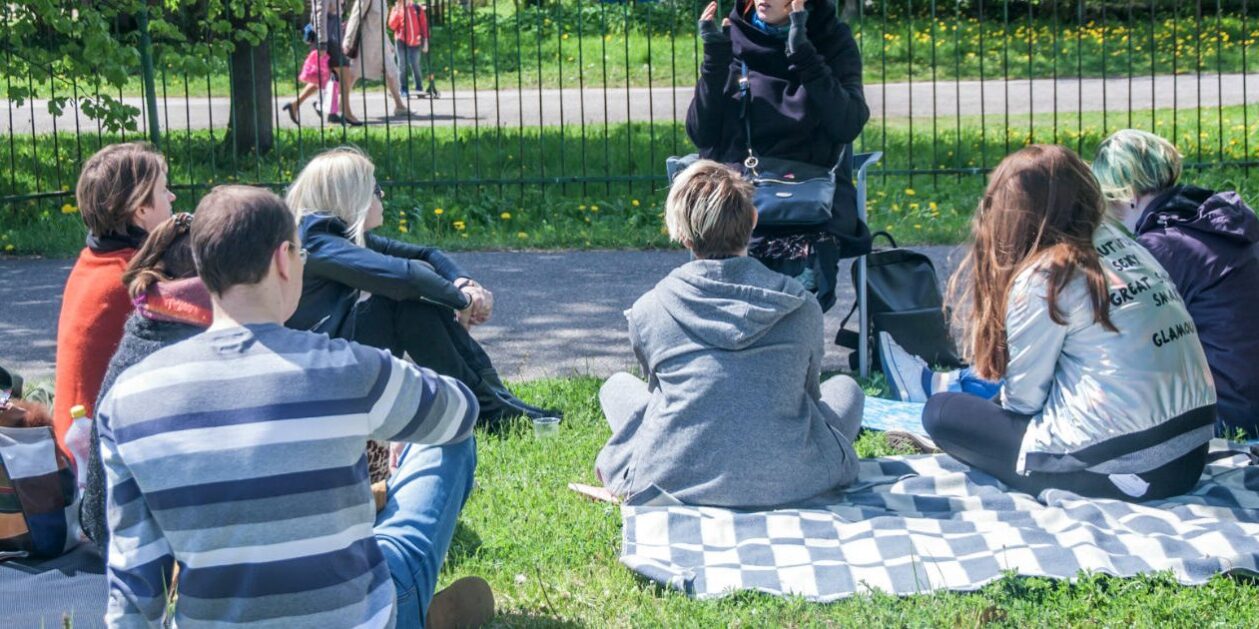Book of the month: The Minimalist from Estonia
Our Human Library Book of the Month is a series of portraits of our books. The portraits are created to offer our readers a chance to understand the diversity and variety on our bookshelves around the world. It also provides unique insights into the motivations and values of being a book and volunteering for our organization.
Living as a minimalist in Estonia
Listening is such a valuable tool. Listening helps you see beyond your own world and helps you understand the world of others.
“Our society is very focused on talking and not enough on listening,” Dagmar says.
Dagmar is from Tallinn in Estonia and has been a book in the Human Library for several years. She has been published six times so far.
At first, Dagmar was published under the title “Vegan”, later as a “Feminist” and now with the title “Minimalist” or the longer version “Embracing minimalism – gaining more space, life and joy, and focusing on green living”.
“I am really happy for my journey of applying minimalist principles to my daily choices and decisions, and everywhere, for example my wardrobe, home, food, entertainment.”
Dagmar uses two basic questions as a minimalist: Do I want it? Do I need it? As she is a highly selective buyer and considers quality, ethics, sustainability and so on, the first one is almost always a yes. But the second one makes you reflect more closely about your choice and the idea of buying stuff in general.
Growing up in Estonia, while the country was under Soviet rule, minimalism was not a choice: There was no other option for most people.
“So, the environment was an interesting mix of people getting overexcited about having something and usually still having just a little,” she says.

Book of the Month for April, Dagmar Kase in talks with readers from Human Library Estonia.
A journey with many chapters
Changing titles in the Human Library has been a natural evolvement for her.
“I have changed as a person over the years. I am not exactly the same vegan I was years ago, and I have more to share. The same with being a feminist. Every time it is a new experience and an exchange of knowledge for me too,” she says.
But listening has always been key to the experience. And 44-year-old Dagmar is learning along the way: How to understand exactly what is being asked and go deeper into the questions, and what the reader has in mind. How to keep a balance of being open and honest and still keeping one’s own boundaries. How to create a safe space for all involved.
“Estonia is a small country. I wanted to test myself at the beginning, because sometimes these stories get really personal. I talk to total strangers in the Human Library, but I might meet them on the street the next day,” she says.
“The one-to-one-approach is very good, like maybe some readers prefer a stranger instead of someone closer to ask what they have on their mind,” she says.
Finding unity is within our reach
Dagmar values the Human Library, because it is accessible for all and provides the possibility for unity.
“The Human Library displays the diversity of lives and lifestyles. Nevertheless, I see often how people with different backgrounds can be united, just being human beings. We can transcend social norms and challenge the stereotypes in this way.”
Dagmar has been an active part of the Human Library in Estonia since 2012, and she feels that people generally are becoming more open.
“It of course depends on the book and the reader. What are their viewpoints, and how sensitive they are, and how they use and apply what was said and learned,” she says.
Meeting readers
As Dagmar has been published with three different titles, the questions have also changed.
“When I was published as “Vegan”, a 13-year old girl approached me with her mother. The girl had several questions about how to become a vegan, but I ended up talking more with her mother, who was worried about her daughter’s nutrition and the loss of unity in the family.”
Some readers are surprised that Dagmar is not aggressive and pushy about being vegan.
“Also, I was asked how to deal with stereotypes about being a vegan. For example that all vegans believe in the exact same things. They are skinny and weak and so on. When I was published as the feminist, I was asked if all feminists are lesbians, and if there are feminist organisations in Estonia. The feminist scene of Estonia in 2012 was less active and visible than today. Also, one person was surprised that I was wearing a dress.”
As a minimalist, Dagmar has been asked to explain what does minimalism mean for her: Is there a set of specific rules, how did she start with minimalism, and how does she deal with gift-giving.”
“I strongly believe in education and knowledge exchange. Education can have a positive impact on everyone’s life. It can heal and comfort, inspire and motivate. This also applies to me as a book, and the readers give me so much in return, even if they don’t see it.”
You can read more about the sources of inspiration and motivation for Dagmar on her blog: https://dtheveganfeminist.wordpress.com/ and you can follow the work of the Human Library Estonia to find opportunities to borrow Dagmar.





